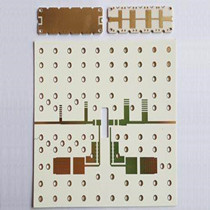
Hochfrequenz -PCB
Wir kaufen diese Materialien von einem Agenten bei Rogers Material. Wir produzieren keine Kernmaterialien. Die folgenden Informationen dienen nur als Referenz.
Hochfrequenz -PCB mit Rogers -Material Die zunehmende Komplexität elektronischer Komponenten und Schalter erfordert kontinuierlich schnellere Signalflussraten, und damit höhere Übertragungsfrequenzen. Wegen kurzer Impulsaufstiegszeiten in elektronischen Komponenten, Es ist auch für hohe Frequenz notwendig geworden (Hf) Technologie zur Betrachtung von Leiterbahnbreiten als elektronisches Bauteil. Abhängig von verschiedenen Parametern, HF -Signale spiegeln sich auf der Leiterplatte wider, was bedeutet, dass die Impedanz (dynamischer Widerstand) variiert in Bezug auf die Sendungskomponente. Um solche kapazitiven Effekte zu verhindern, Alle Parameter müssen genau angegeben werden, und implementiert mit dem höchsten Maß an Prozesskontrolle. Kritisch für die Impedanzen in Hochfrequenzschaltplatten sind hauptsächlich die Leiterspurengeometrie, der Schichtaufbau, und die dielektrische Konstante (εr) der verwendeten Materialien.
ALCANTA-Leiterplatte vermittelt Ihnen Know-how, Alle gängigen Materialien und qualifizierte Herstellungsverfahren – auch bei komplexen Anforderungen zuverlässig.

Rogers PCB
Materialien, die für HF -Leiterplatten verwendet werden :
Hochfrequenzbretter, Beispielsweise für drahtlose Anwendungen und Datenraten im oberen GHz-Bereich stellen besondere Anforderungen an das verwendete Material: Adapted Permittivity Niedrige Dämpfung für eine effiziente Signalübertragung homogener Konstruktion mit geringen Toleranzen in der Isolationsdicke und der Dielektrizitätskonstante für viele Anwendungen, es reicht aus, FR4-Material mit entsprechendem Schichtaufbau zu verwenden. Zusätzlich, Wir verarbeiten Hochfrequenzmaterialien mit verbesserten dielektrischen Eigenschaften. Diese haben einen sehr geringen Verlustfaktor, eine niedrige Dielektrizitätskonstante, und sind in erster Linie Temperatur und Frequenz unabhängig. Zusätzliche günstige Eigenschaften sind hohe Glasübergangstemperaturen, Eine ausgezeichnete thermische Haltbarkeit, und sehr niedrige hydrophile Geschwindigkeit. Wir verwenden (unter anderem) Rogers oder PTFE -Materialien (Zum Beispiel,Teflon aus Dupont) Für impedanz kontrollierte Hochfrequenzschaltplatten. Sandwich -Ansammlungen für Materialkombinationen sind ebenfalls möglich.
Impedanzprüfung :Die vom Kunden definierte Impedanz wird von unseren Cam -Station -Ingenieuren auf Herstellbarkeit getestet. Abhängig vom Schichtaufbau, Das PCB -Layout und die angeforderten Kunden impedieren ein Berechnungsmodell, das ausgewählt wird. Das Ergebnis ist eine erforderliche Änderung des Schicht Builduo und die erforderlichen Anpassungen an den zuständigen Leitergeometrien. Nach der Herstellung von Hochfrequenzschaltplatten, Die Impedanzen werden überprüft (mit einer Präzision von bis zu 5%), und die detaillierten Ergebnisse werden genau in einem Testprotokoll aufgezeichnet.
| Eigentum | Typisch Wert (1) | Richtung | Einheit | Zustand | Prüfen Verfahren | |||
| RO3003 | RO3035 | RO3006 | R O3010 | |||||
| Dielektrizitätskonstante, r Verfahren | 3.00 ± 0.04 | 3.50 ± 0.05 | 6.15 ± 0.15 | 10.2 ± 0.30 | Z | – | 10 GHz 23°C | IPC-TM-650 2.5.5.5 Stripline |
| (2) Dielektrizitätskonstante, r Design | 3.00 | 3.60 | 6.50 | 11.20 | Z | – | 8 GHz – 40 GHz | Differentialphasenlängenmethode |
| Verlustfaktor, tan | 0.0010 | 0.0015 | 0.0020 | 0.0022 | Z | – | 10 GHz 23°C | IPC-TM-650 2.5.5.5 |
| Wärmekoeffizient von r | -3 | -45 | -262 | -395 | Z | ppm/° C. | 10GHz -50 bis 150°C | IPC-TM-650 2.5.5.5 |
| Dimensionsstabilität | -0.06 0.07 | -0.11 0.11 | -0.27 -0.15 | -0.35 -0.31 | X und | mm/m | Dulden a | IPC TM-650 2.2.4 |
| Volumenwiderstand | 107 | 107 | 105 | 105 | M•cm | Dulden a | IPC 2.5.17.1 | |
| Oberflächenwiderstand | 107 | 107 | 105 | 105 | M | Dulden a | IPC 2.5.17.1 | |
| Zugmodul | 930 823 | 1025 1006 | 1498 1293 | 1902 1934 | X und | MPA | 23°C | ASTM D638 |
| Feuchtigkeitsaufnahme | 0.04 | 0.04 | 0.02 | 0.05 | – | % | D48/50 | IPC-TM-650 2.6.2.1 |
| Spezifische Wärme | 0.9 | 0.86 | 0.8 | J/g/K | Berechnet | |||
| Wärmeleitfähigkeit | 0.50 | 0.50 | 0.79 | 0.95 | – | W/m/K | 50°C | ASTM D5470 |
| Wärmeleitkoeffizient (-55 Zu 288 °C) | 17 16 25 | 17 17 vierundzwanzig | 17 17 vierundzwanzig | 13 11 16 | X y z | ppm/° C. | 23°C/50 % relative Luftfeuchtigkeit | IPC-TM-650 2.4.41 |
| Td | 500 | 500 | 500 | 500 | ° C TGA | ASTM D3850 | ||
| Dichte | 2.1 | 2.1 | 2.6 | 2.8 | gm / cm3 | 23°C | ASTM D792 | |
| Kupferschalenstärke | 12.7 | 10.2 | 7.1 | 9.4 | lb/in | 1 oz. EDC Nach dem Lotschwimmen | IPC-TM-2.4.8 | |
| Entflammbarkeit | V-0 | V-0 | V-0 | V-0 | Ul 94 | |||
| Bleifrei, prozesskompatibel | JA | JA | JA | JA | ||||
Schaltungsmaterialien der Serie RO3000®
RO3003™, RO3006™, RO3010™ und RO3035™
Hochfrequenzlaminate
RO3000®-Hochfrequenzschaltungsmaterialien sind mit Keramik gefüllte PTFE-Verbundwerkstoffe, die für den Einsatz in kommerziellen Mikrowellen- und HF-Anwendungen vorgesehen sind. Diese Produktfamilie wurde entwickelt, um außergewöhnliche elektrische und mechanische Stabilität zu wettbewerbsfähigen Preisen zu bieten.
Bei den Laminaten der RO3000-Serie handelt es sich um keramikgefüllte Schaltkreismaterialien auf PTFE-Basis mit gleichbleibenden mechanischen Eigenschaften, unabhängig von der gewählten Dielektrizitätskonstante. Dies ermöglicht es dem Designer, mehrschichtige Platinendesigns zu entwickeln, die Materialien mit unterschiedlichen Dielektrizitätskonstanten für einzelne Schichten verwenden, ohne dass es zu Verzugs- oder Zuverlässigkeitsproblemen kommt.
RO3000-Materialien weisen einen Wärmeausdehnungskoeffizienten auf (CTE) in der X- und Y-Achse von 17 ppm/oC. Dieser Ausdehnungskoeffizient ist dem von Kupfer angepasst, Dadurch weist das Material eine hervorragende Dimensionsstabilität auf, mit typischer Ätzschrumpfung (nach dem Ätzen und Backen) von weniger als 0.5 Mil pro Zoll. Der CTE der Z-Achse beträgt 24 ppm/°C, Dies bietet eine außergewöhnliche Zuverlässigkeit bei der Durchkontaktierung, auch in rauen thermischen Umgebungen. Die Dielektrizitätskonstante im Verhältnis zur Temperatur für RO3003™ und RO3035™ Materialien ist sehr stabil (Diagramm 1).
Laminate der RO3000-Serie können mithilfe standardmäßiger PTFE-Leiterplattenverarbeitungstechniken zu Leiterplatten verarbeitet werden, mit geringfügigen Änderungen, wie im Anwendungshinweis „Fabrication Guidelines for RO3000 Series High Frequency Circuit Materials“ beschrieben. Unsere E-Mail: info@alcantapcb.com
 ALCANTA-TECHNOLOGIE(SHENZHEN)CO.,LTD
ALCANTA-TECHNOLOGIE(SHENZHEN)CO.,LTD